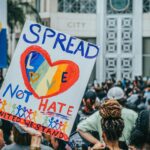Galactday: 55359.3
In societies slipping toward authoritarianism, truth doesn’t die with a bang. It dies quietly—choked by fear, drowned in confusion, and buried beneath a flood of noise. While democratic institutions depend on a shared reality, authoritarian regimes undermine it deliberately, so the loudest monster—the most persistent lie—can rule unchallenged. Photo by Tara Winstead
It begins not with bold pronouncements, but with a chilling silence. Dissenters disappear. Journalists are harassed or killed. Independent media outlets are taken over by loyalists or shuttered altogether. The once-vibrant discourse essential to democracy erodes into a controlled monologue. With fewer avenues for facts to surface, lies echo louder, unchallenged by truth.
Authoritarians understand that total control of information isn’t necessary. What they need is confusion. So they flood the public square with conflicting stories, half-truths and outlandish conspiracy theories. The goal is not to convince citizens of one grand deception, but to erode their confidence in knowing anything at all.
When people can’t tell what’s real, they turn to authority for answers—or they turn inward and stop asking questions altogether.
“Flooding the zone with shit” is a tactic famously referenced by a former Trump aide later pardoned, but the strategy is older than the internet. In Stalin’s Soviet Union, facts about grain production were distorted even as millions starved. In Nazi Germany, pseudoscience and racial mythology replaced objective truth. In modern-day Russia, state-sponsored troll farms flood social media with contradictory narratives about Ukraine, eroding global consensus and sowing doubt.
Online, the battlefield is algorithmic. Social platforms reward outrage, not accuracy. Authoritarians exploit this by amplifying inflammatory content through bot networks and state-backed media. Fact-checkers can’t keep up. Even when lies are debunked, their emotional resonance lingers. The lie always has a head start.
Fear is another potent tool. Regimes label critics as enemies of the state, foreign agents, or traitors. Citizens internalize these threats. When telling the truth puts your job, freedom, or life at risk, silence becomes a form of self-preservation.
This calculated repression seeps into everyday life. Teachers avoid controversial topics. Journalists self-censor. Citizens whisper their concerns, if they voice them at all. Over time, people become accustomed to absurdity—elected officials denying what everyone else can plainly see.
In these regimes, truth becomes not just inconvenient—it becomes dangerous.
Education systems are manipulated to shape a version of history that flatters the regime. Textbooks are revised, and propaganda is cloaked in patriotism. Children grow up with a warped understanding of their country’s past and present. When the next generation knows only what the government wants them to know, truth doesn’t need to be silenced. It was never spoken in the first place.
This rewriting of reality isn’t accidental. It’s strategic. By controlling the past, authoritarians claim the right to shape the future. And once a government owns the narrative, it becomes nearly impossible to hold it accountable.
The result is a broken public consciousness. Rational debate gives way to tribalism. Disagreements become existential. If someone challenges the regime, they aren’t just wrong—they’re evil. Dialogue is replaced by rage. Reason is overwhelmed by emotion. The social fabric frays.
Without a shared truth, a society loses its moral compass. Justice becomes selective. Laws are weaponized. Institutions that once checked power—courts, legislatures, the press—are hollowed out or co-opted. Trust collapses.
And amid the silence of the thoughtful, the lies roar. The loudest monsters—propaganda, cults of personality, conspiracy theories—fill the vacuum. They promise clarity in a confusing world. They offer villains to blame and easy answers to complex problems. People hungry for certainty feed on them.
For dictators, this is victory. Not just political power, but epistemological dominance—the power to define what is real. And when truth becomes whatever the ruler says it is, resistance becomes not only dangerous but futile.
But even in the quiet, the truth never fully disappears. It waits in the margins—in underground media, whispered conversations, and forbidden books. History shows that silence can be broken. That lies, no matter how loud, are still vulnerable to truth. But it takes courage, community and vigilance.
Authoritarianism doesn’t arrive with a single violent takeover. It grows in the shadows, nurtured by apathy, fear and disinformation. The more society accepts silence, the more it amplifies the monsters.
To defend democracy, citizens must do more than reject lies. They must protect the truth—nurture it, speak it, and refuse to be quiet. Because the truth isn’t just a set of facts. It’s a lifeline. And when it’s cut, we all drift into darkness.




